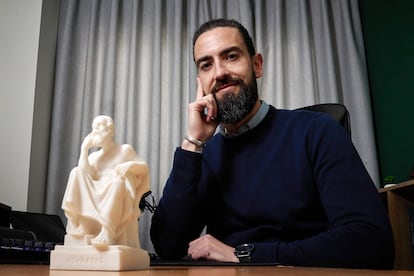Existential doubts? Go see a philosopher instead of a psychologist
Philosophical consultation has long operated in the shadows, aiming to resolve crucial dilemmas and foster life tolerance rather than treat mental health issues

In December 2023, The New Yorker ran a piece on a profession that’s been in the shadows for years: philosophical counseling. It’s straightforward: a client goes to a philosopher’s office and shares their existential concerns. The session’s direction varies based on the chosen counselor. This service doesn’t address mental health issues; instead, it guides clients to ponder deep philosophical topics like the meaning of life, ethics and freedom. Proponents claim that this practice revives the practical essence of ancient philosophy, echoing Epicurus’ famous quote: “Vain is the word of a philosopher which does not heal any suffering of man. For just as there is no profit in medicine if it does not expel the diseases of the body, so there is no profit in philosophy either, if it does not expel the suffering of the mind.”
In Spain, finding a philosopher is a simple Google search away. The cost averages around €60 ($65) per session, similar to a psychologist. It’s usually called a consultation or advice session, but Omar Linares calls it philosophical support. Linares lives in Granada, in southern Spain). He has a PhD in philosophy and nine years of experience in this field. He used to have a physical office but now works exclusively online. His customers range between 20 and 60 years of age, there are more women than men, and they typically have a university education. “But everyone’s a world unto their own. Each existential crisis is like its own little world,” he says. Some come to him because they have discovered philosophical counseling by reading a book like the classic Plato Not Prozac!, by Lou Marinoff. “But what excites me the most,” said Linares, “is when people think, ‘Hey, this should be a thing,’ and then they Google it only to find out it’s already out there!”
Before the initial session, Linares conducts a 20-minute interview with potential clients. He explains basic philosophical counseling concepts and addresses any questions they may have. “Many people ask if knowing philosophy is necessary, and I tell them no. Sometimes I recommend some reading, but the emphasis is on reflection and analyzing the client’s thoughts. In the first session, I ask, ‘What brings you here?’ to assess if this type of counseling will suit their needs. For people with anxiety or severe depression, psychology may be more beneficial. Philosophy could be counterproductive in cases of severe mental disorders.”
There is no standard script for philosophical counseling sessions. The New Yorker article itself noted the “heterogeneity” of approaches used in philosophical counseling sessions, which range from “guided meditations to targeted explorations of existentialist, Kantian and Stoic philosophy. The National Philosophical Counseling Association emphasizes a method called logic-based therapy. Both organizations require members to have a master’s or a doctorate in philosophy in order to become certified practitioners.”
Elliot D. Cohen, co-founder of the NPCA, applies a method called Logic-Based Therapy (LBT), which he developed with psychotherapist Albert Ellis. “This method helps clients recognize and fix logical fallacies in their thinking patterns, which can cause emotional and behavioral issues,” he said. Unlike psychological therapies, this method targets a person’s underlying beliefs rather than emotions or the unconscious.
“Using philosophical consultation for a client enduring psychological abuse from her spouse would involve identifying irrational beliefs or fallacies shaping her self-perception and viewpoint on her situation to kickstart the therapeutic process,” said Cohen. Identify illogical beliefs, then help the client question and reframe them for a healthier understanding of their situation. “Encourage the client to make constructive, reality-based statements. For instance, she should understand that respect is a basic right in any relationship and her worth isn’t tied to her husband’s treatment.”
Philosophical counseling began in 1981 when Gerd Achenbach opened the first recognized practice in Bergisch Gladbach near Cologne (Germany). Soon, other philosophers worldwide joined in. Since 2016, Carmen Zanetti, a philosophical counselor from Spain, has been aiming to restore the practical aspects of philosophy by addressing personal concerns and conflicts. “Many philosophical counselors are concerned that philosophy has drifted from its roots in human life, leaving people with the mistaken belief that philosophy is disconnected from their personal concerns and emotions,” she said.
This idea is echoed by the philosopher Rafael Narbona, who wrote in the foreword to his recent book, Maestro de la felicidad [Masters of Happiness] that philosophy isn’t an instruction manual, but a spiritual guide and a path to healing. “It helped me conquer inner demons and find peace with my existence,” he wrote. Spanish philosopher Ana Carrasco Conde said, “Philosophy doesn’t bring happiness, but it fosters wisdom in living with oneself and others, helping discern true value.” Philosophy is an instrument of change and revolution, she says, as it offer tools to break the mold. “It’s comforting because it fosters understanding, and empowering because it provides tools for objective thinking. Philosophy heightens awareness of societal shortcomings to empower decision-making for change or status quo.”
The problem with philosophical counseling, according to Carrasco, is that “it’s not philosophy.” Rather, it “applies philosophical tools in a non-philosophical context influenced by psychological therapies and coaching.” Still, she thinks it can be useful and valid much like medication and self-help. “But it’s not a return to the roots of ancient philosophy; philosophical counseling has a different focus.” Carrasco believes philosophy should stem from curiosity and understanding, and not just focus on solving problems. She emphasizes how philosophy fosters reflection and openness to the world and other people. “Philosophical counseling is all about wanting to be heard. But life isn’t always that way... at least not if we’re aiming for one that’s meaningful and good.”
Sign up for our weekly newsletter to get more English-language news coverage from EL PAÍS USA Edition
Tu suscripción se está usando en otro dispositivo
¿Quieres añadir otro usuario a tu suscripción?
Si continúas leyendo en este dispositivo, no se podrá leer en el otro.
FlechaTu suscripción se está usando en otro dispositivo y solo puedes acceder a EL PAÍS desde un dispositivo a la vez.
Si quieres compartir tu cuenta, cambia tu suscripción a la modalidad Premium, así podrás añadir otro usuario. Cada uno accederá con su propia cuenta de email, lo que os permitirá personalizar vuestra experiencia en EL PAÍS.
¿Tienes una suscripción de empresa? Accede aquí para contratar más cuentas.
En el caso de no saber quién está usando tu cuenta, te recomendamos cambiar tu contraseña aquí.
Si decides continuar compartiendo tu cuenta, este mensaje se mostrará en tu dispositivo y en el de la otra persona que está usando tu cuenta de forma indefinida, afectando a tu experiencia de lectura. Puedes consultar aquí los términos y condiciones de la suscripción digital.









































